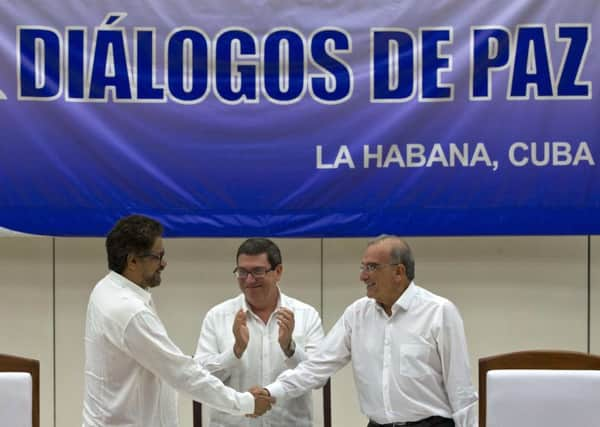Ulster's cautious welcome for Colombia-FARC peace deal


The government’s accord with the Revolutionary Armed Forces of Colombia (FARC) must still be ratified by voters in a referendum on October 2.
FARC began after the 1948 assassination of populist union activist Jorge Eliecer Gaitan. Most Colombians consider the group “narco-terrorists” while it views Colombia’s establishment as “oligarchs” at the service of the US.
Advertisement
Hide AdAdvertisement
Hide AdDUP MP Jeffrey Donaldson welcomed the deal, saying he has visited Columbia four times in recent years.
“We shared our experience on issues such as decommissioning and the transition from violence and conflict to a peaceful society,” he said. There will be no amnesty for FARC members and proposals are in place to support victims of violence, he added.
Sinn Fein MLA Conor Murphy, who also travelled to Colombia to assist the peace process, welcomed the deal.
“This follows two years of peace talks in Havana, which Sinn Fein supported and participated in,” he said. “I and other Sinn Fein representatives have travelled to Colombia and Cuba to meet with both sides and share our experiences of building peace.”
Advertisement
Hide AdAdvertisement
Hide AdUUP leader Mike Nesbitt noted Colombia’s conflict cost 220,000 lives and saw millions displaced over 52 years of violence.
Wishing the country well for the future, he cautioned: “If the Northern Ireland experience is anything to go by, there will be trying times ahead, and the good intent of all sides will be sorely tested.”
SDLP Foyle MP Mark Durkan also welcomed the news but said support from the international community would be important for it to succeed. “Those who have reached this agreement which covers vexed issues will need to maintain an axis of understanding, mutual respect and shared adherence to its spirit and terms.”
Kenny Donaldson, of Innocent Victims United, welcomed the fact that the Colombian people had reached a deal which he hoped would see them “free from the terrorism” but he warned Colombia to learn from what he sees as Northern Ireland’s mistakes. “Justice, truth and accountability must not be sacrificed otherwise reconciliation will prove elusive.”
Advertisement
Hide AdAdvertisement
Hide AdVictims campaigner Willie Frazer, who visited victims in the country, said that to make the deal work “they must not forget what their people have suffered like our Government did when they signed the Belfast agreement”.
The arrest of three Irish republicans in Colombia back in August 2001 sparked a major controversy in the Northern Ireland political process.
Niall Connolly from Lurgan, James Monaghan from Donegal and Martin McCauley from Dublin were arrested at Bogota International Airport and convicted in Colombia in 2003 of travelling on false passports, accused of being members of the IRA. Sinn Fein’s Caitriona Ruane led a campaign to “bring them home”.
While awaiting appeal by the prosecution, the three men were instructed to remain within the country and were given seventeen years for training FARC in bomb making in 2004.
Advertisement
Hide AdAdvertisement
Hide AdHowever they fled Colombia and secretly returned to the Republic of Ireland. They were questioned by Garda but no moves were taken to extradite them, despite the existence of an Colombian arrest warrant. The two countries had no extradition treaty.
In 2005 Interpol informed its members about an arrest warrant for the men. However the Irish Department of Justice said yesterday there were “no extant proceedings in this jurisdiction in relation to this matter”.